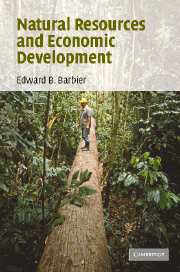Book contents
- Frontmatter
- Contents
- List of figures
- List of tables
- Acknowledgments
- Introduction
- 1 Natural resources and developing countries: an overview
- 2 Natural resource-based economic development in history
- 3 Does natural resource dependence hinder economic development?
- 4 Frontier expansion and economic development
- 5 Explaining land use change in developing countries
- 6 The economics of land conversion
- 7 Does water availability constrain economic development?
- 8 Rural poverty and resource degradation
- 9 Can frontier-based development be successful?
- 10 Policies for sustainable resource-based development in poor economies
- References
- Index
3 - Does natural resource dependence hinder economic development?
Published online by Cambridge University Press: 06 July 2010
- Frontmatter
- Contents
- List of figures
- List of tables
- Acknowledgments
- Introduction
- 1 Natural resources and developing countries: an overview
- 2 Natural resource-based economic development in history
- 3 Does natural resource dependence hinder economic development?
- 4 Frontier expansion and economic development
- 5 Explaining land use change in developing countries
- 6 The economics of land conversion
- 7 Does water availability constrain economic development?
- 8 Rural poverty and resource degradation
- 9 Can frontier-based development be successful?
- 10 Policies for sustainable resource-based development in poor economies
- References
- Index
Summary
The introductory chapter highlights the structural dependence of many low and middle-income economies on natural resource exploitation. Chapter 3 reviews many theories that, on the whole, suggest that natural resource exploitation has been the main feature of economic development and trade in the developing world historically. These theories generally suggest that the exploitation of the natural resources of a country is, at the very least, an important first step in its economic development. However, the evidence presented in Chapter 1 indicates that increasing economic dependence on natural resources in today's low and middle-income economies is associated with poorer economic performance. As emphasized throughout Part One of this book, this poses an intriguing paradox. Why is it that, despite the importance of natural capital for sustainable economic development, increasing economic dependence on natural resource exploitation appears to be a hindrance to growth and development in today's low and middle-income economies?
Conventional explanations suggest that the comparatively poor growth performance of low-income countries can be attributed to failed policies and weak institutions across the economy, including the lack of well-defined property rights, insecurity of contracts, corruption and general social instability (Keefer and Knack 1997; Mauro 1995; Murphy et al. 1993; Pack 1994; World Bank 1992). As we shall see, weak institutions in particular may be an important part of the story as to why resource-rich countries display disappointing rates of growth and development.
- Type
- Chapter
- Information
- Natural Resources and Economic Development , pp. 108 - 154Publisher: Cambridge University PressPrint publication year: 2005



